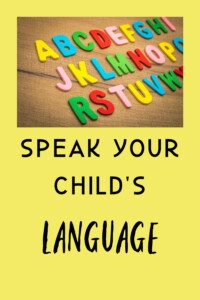Speak Your Child’s Language

Your child’s language
Learn to speak your child’s language. His is different than yours. Too often adults speak to children in a language they don’t understand. That is because our kids are not well-versed in our language. Pre-school children do not have a grasp on time or days beyond today. So, we need to speak their language.
A young child does not understand what “time out for five minutes” means. He does not speak “time” language. He does not even understand time, so telling him that when the clock says such-and-such is speaking a different language than he speaks. We need to use visuals or auditory signals to help children understand. We need to speak their language. Do not expect them to understand ours!

Visual rewards
When our foster kids waited anxiously the week our daughter was coming home from college, I made a paper chain. Each morning they took one link off the paper chain. They knew that when the last link came off, that was the day she was coming home. To tell them she would be home in five days left them clueless. But getting up each morning and tearing off one more link helped them understand the wait and the time frame.
Don’t tell your preschooler, “When you have gone five days without . . . then . . . . . ” Instead, make a check-off list or a sticker chart. Put a positive spin on the infraction. When . . . then! For each day there is no pinching, a sticker or check is placed on a spot for that day. The child can see the empty spaces and she can understand that each space must have a sticker before she gets the reward. She also understands that pinching means no sticker for that day. So, speak your child’s language!
You can use this method when you’re potty-training, working on picking up toys, or when it’s time to get ready for bed. When a child can visually see the progress he is making, he will more readily cooperate. He will also want to try harder because he understands what he must do.
Win-win
Speaking your child’s language is a win-win. He will not longer seem as defiant and will more willingly obey. He will do this because he will understand your language. That’s because you now speak his language.

Note: The idea for this post came from my daughter Sarah Beth, who has two little boys. She set a timer for her 26-month-old son to let him know that when the timer went, he was going to bed. I witnessed no fussing or crying, just quiet obedience.






